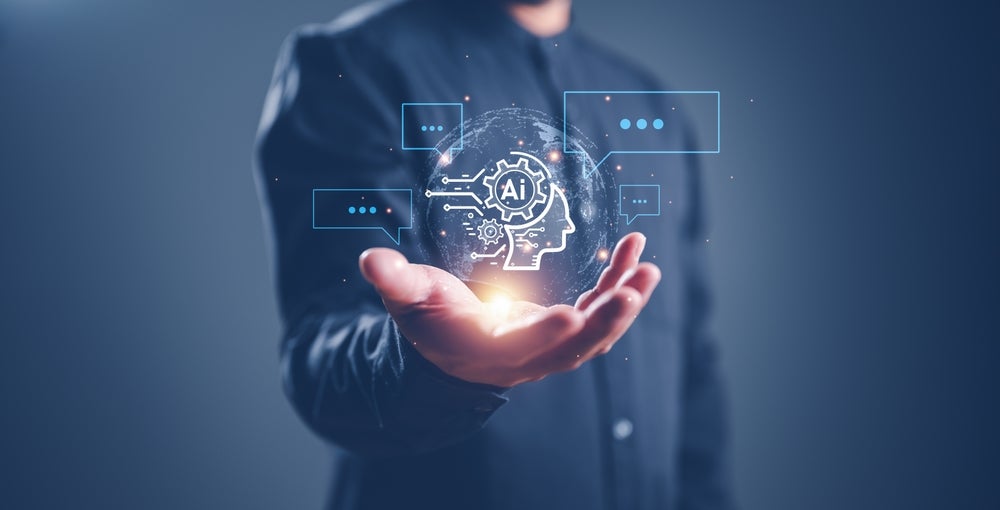
The recent assertion by Jensen Huang, the founder and CEO of tech company NVIDIA, that artificial intelligence (AI) has reached a tipping point begged the question of what we can expect in the future.
Speaking to Verdict, industry leaders and experts were split on whether they felt the technology had reached such a milestone, but all believed that it was, at the very least, well on its way to doing so.
Their views about the benefits that AI will bring remain optimistic, but there is a widespread believe that there will be serious challenges to overcome along the way – in particular to do with ethics, the environment and, of course, security.
The environmental challenge of AI
“Navigating the AI landscape presents a dual narrative of unprecedented potential and significant challenges,” says Peter Wood, chief technical officer at web3 recruiters Spectrum Search. “The ethical implications of AI’s ascendancy are a labyrinth of complexity. Issues surrounding data privacy, security, and the potential for algorithmic bias pose formidable challenges that demand innovative solutions and rigorous oversight. The environmental impact of training sophisticated AI models also calls for a concerted effort towards more sustainable computing practices.”
Indeed, much like cryptocurrency before it, AI is raising serious concerns about its potential impact on the environment. Like Wood, Anthony Oduu, co-founder and chief technology and product officer at payments infrastructure firm Verto, pointed to the energy consumption of training AI models as a major consideration.
How well do you really know your competitors?
Access the most comprehensive Company Profiles on the market, powered by GlobalData. Save hours of research. Gain competitive edge.

Thank you!
Your download email will arrive shortly
Not ready to buy yet? Download a free sample
We are confident about the unique quality of our Company Profiles. However, we want you to make the most beneficial decision for your business, so we offer a free sample that you can download by submitting the below form
By GlobalDataSee Also:
“Training sophisticated models will consume a vast amount of energy, so the sustainability of different AI models will likely come under progressively sharper focus over time,” he explains.
This view is echoed by Dr Chris Pedder, chief data scientist at AI-powered digital learning provider Obrizum, who warns: “Staggering energy usage, with models like [OpenAI’s video text-to-video engine] Sora having footprints comparable to using a washing machine seven times, is unsustainable. This is why new chip architectures are imperative and presumably where funding is going.”
Dr Leslie Kanthan, co-founder and CEO of AI code optimisation outfit TurinTech, which works in part to reduce the power consumption of the technology, says of issue: “The environmental impact of generative AI, particularly its carbon footprint, will also soon emerge as a central topic of discussion and concern. As the usage of the generative AI grows, so too will scrutiny of its energy consumption and consequent emissions.”
Keeping up with AI: elections, regulation and skills
Beyond environmental issues, there are concerns about the pace with which AI is developing and the extent to which regulators and countermeasures can keep up.
Oduu notes: “Caution is needed regarding the speed of development. Regulators are tasked with striking a delicate balance between encouraging innovation and implementing safeguards to address ethical concerns, data privacy and potential biases in AI systems. On a global scale, this becomes particularly challenging as we will likely see tension between multinational private corporations that are leading development and national governments and policies attempting to regulate developments.
“A lot of talk focuses on the benefits for individuals and businesses and the risks that AI can pose. Yet, what is often overlooked is the broader societal impact of large-scale AI models. These sophisticated models, due to their complexity and computational power needed, can bear significant consequences on various sectors.”
Pedder points to the use of AI to influence elections as one potentially serious issues to confront.
“With billions voting in 2024, risks of misinformation proliferation via ‘firehoses of falsehood’ are real too, and something to keep a close eye on this year,” he says.
This is a concern shared by Leon Gauhman, chief strategy officer at digital product consultancy Elsewhen.
“A key challenge is likely to be bad actors using AI or artificial general intelligence (AGI) for illegal purposes and the difficulties of regulating that,” he comments. “In a year of global elections, computers can already use AI to create false videos featuring political candidates’ faces and launch them onto social media with potentially serious consequences. Google’s Gemini generating the faces of women and people of colour in inaccurate and offensive historical contexts, is a good example.”
Martin Neale, CEO of AI transformation agency ICS.AI believes that the speed of development could necessitate new approaches in order to keep adapt to the changing landscape quickly enough.
He argues: “The primary challenge in the coming years will be adapting to the rapid pace of change within core AI technologies. What used to take years in terms of invention, availability, and improvement now happens in mere months. This will require a degree of flexibility that may initially feel unfamiliar. However, the potential benefits are substantial. Generative AI could offer personalised support in various aspects of our lives and work. It also has the potential to drive a digital renaissance, fostering a period of enhanced creativity and innovation.”
Similarly, Pedder suggests that the development of AI could outpace that of the expertise to required manage it.
“The technical skills gap is something which companies of all sizes are battling with, especially given the challenges in recruiting ready-made talent,” he says. “Therefore, upskilling is vital and AI’s ability to deliver adaptive, automated learning can ensure the workforce is built to keep pace with modern demands.”
Of this issue, Felix Ohswald, co-founder and CEO of edtech firm GoStudent, points to the need to equip young people with skills for a future in which AI is ubiquitous.
“Undeniably, the adoption of new technology is exceedingly high in younger people, so we must learn to evolve with the developments of AI tools,” he says.
“Instead of ignoring these platforms and enabling children to bypass the education system, we should be teaching students how to engage with these platforms effectively, then consequently shift the curriculum to match this and measure them on ‘new-world’ skills.”
The future benefits of AI
Of course, the widespread belief is that the ultimate benefits that AI will offer far outweigh the challenges.
As Rob Young, CEO at IT services firm Infinity Group, explains: “The renewed buzz around AI has led to greater interest and engagement among business leaders and decisionmakers and opened conversations about AI adoption and integration. Generative AI tools have opened a door that technology leaders have been pushing at for a long time, but it’s the real-world tangible use cases that have accelerated adoption.
“Fair, safe usage, proper governance and robust policies are clearly crucial when it comes to mitigating the challenges inherent with AI but delivering immediate business value lies in understanding the AI-readiness of existing systems, data infrastructure, and the wider IT estate.”
While large-language models (LLMs) like OpenAI’s ChatGPT are now being built into business tools and processes, many of the questions about AI are focused on what will comes next. For Gauhman, it is initially about the spread of the technology.
“In the short term, AI will become ubiquitous – a bit like WiFi or other utilities we are used to,” he predicts. “In the medium term we will see another paradigm shift (or tipping point) which could take the form of AGI. This will be the equivalent of having human levels of intelligence, which understand context and the world at the same level that a human does, with access to the powers of a computer.”
Michal Szymczak, head of AI strategy at digital solutions provider and Deloitte Fast 50 company Zartis, suggests that this advancement will also be reflected in the sophistication of what AI more broadly can achieve.
“In the next three years, we’ll stop being able to recognise what’s AI-generated and turn our focus to making counter measures instead,” he says. “For example, by looking to blockchain solutions to confirm if something is AI generated.
“It’s impossible to anticipate how much change there will be. But companies who invest, understand and follow the growth will be the winners in the AI rat race.”
Wood echoes this sentiment, believing that the short to mid-term future will see what he calls “a tapestry of AI-driven innovation and transformation.”
“We are not merely looking at incremental enhancements but at a radical reimagining of processes, services and products,” he argues. “The near future will unveil AI applications that streamline complex tasks, personalise consumer experiences at an individual level, and solve problems that have long eluded conventional approaches. This period will witness the democratisation of AI, with tools and platforms becoming more accessible to non-experts, thereby catalysing innovation across the board …
“The benefits of AI are vast and varied. From driving efficiency and productivity across industries to unlocking new frontiers in research and development, AI’s potential is virtually limitless. The prospect of AI in addressing critical global challenges, such as climate change and healthcare disparities, is particularly compelling. Balancing these challenges and benefits requires a forward-thinking approach that prioritizes ethical considerations, inclusivity, and sustainability alongside technological advancement.”
AI is not the only highly promising and fast-developing technology, of course. As Oduu points out: “Even as AI continues to make headlines, it is important to note that technological advancement is constantly in flux, and new technologies will emerge. Emerging technologies that could replace the AI hype might be quantum and neuromorphic computing or advanced robotics.”







